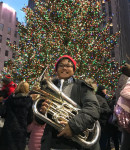Featured Music Teachers In Connecticut

Bruce G
Instruments: Piano, Trumpet, Trombone, Euphonium, Tuba, Music
Nothing is more rewarding than seeing one of my students develop a passion for music! Therefore, it is important that each student progresses at his or her own pace. I encourage this by setting realistic goals for my students at each lesson. Acknowledging accomplishments helps fuel a students desire to progress, and makes students eager to learn more. By trying to find out what inspires the student, I can successfully tailor my instruction to their wants and needs. Read More

Lauren G
Instruments: Voice, Violin, Electric Violin, Music
I strive to make my lessons fun! Learning to do something you love should be fun. I enjoy teaching students especially when they have a strong passion for what they are doing. I encourage them to practice daily, if nothing else. I always say, even if it's only 10 minutes a day, that's better than 30 minutes only one day of the week! Even if you are very talented, you still must practice to get better. Read More

William P
Instruments: Piano, Voice, Flute, Synthesizer, Euphonium, Music, Keyboard
I am no drill sergeant, but I wont lie to you either. I know when you've practiced and when you haven't. I encourage you and always be honest with you about your progress. I am on your side and want you to succeed. That being said, I have a fairly structured lesson. Starting with a breif warm up, we wilk touch upon a review of the previous lesson, technique drills, and then the music we are currently workung on. Read More

Tamara W
Instruments: Piano, Guitar, Voice, Music, Keyboard, Acoustic Guitar
I use a variety of different pedagogical approaches from Music for the Classroom - Kodaly and Orff methodology, to series like Hal Leonard, the Music Tree (Frances Clark), Piano Adventures (Randall and Nancy Faber), John Thompson and Alfred's Piano Basics. In Voice, my approach is ecclectic but effective, drawing from traditional Classical approaches & vocal building techniques to some of the latest ideas and discoveries on developing a beauty of sound and a solid foundation in the control of the breath. Read More

Paul F
Instruments: Piano, Guitar, Voice, Drums, Bass Guitar, Organ, Synthesizer, Banjo, Ukulele, Mallet Percussion, Orchestral Percussion, Latin Percussion, Music, Keyboard, Electric Guitar, Acoustic Guitar
I have been teaching private lessons since 2006 and love doing so. I volunteered at my arts high school for 2 years helping with all of the Jazz Band, AP Music Theory, and private instruction in multiple instruments. In 2009 I graduated from Cooperative Arts & Humanities Magnet High School focusing in Music. During my time there I also took AP Music Theory classes, as well as attended 2 summer and winter programs through the Yale School of Music. Read More

BBB Accredited
Don't just take our word for it. We hold the highest possible A+ rating from the nations foremost online reliability source: The BBB. Check out our A+ rating from the Better Business Bureau.